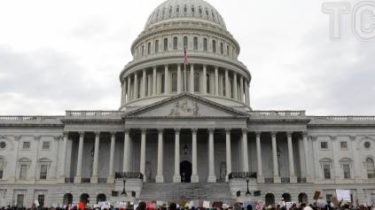The United States Congress introduced a new bill on sanctions against Russia

Democrats in the U.S. House of representatives introduced a new version of the bill on sanctions against Russia and Iran.
So they want to give a signal US President Donald Trump about the need for tough policy of the Kremlin, according to Reuters.
It is noted that this document does not differ from the text that on 15 June by a majority of votes approved the U.S. Senate, but the House of representatives, it still has not been put to a vote.
See also:
In the U.S. Congress in favor of the early adoption of sanctions against Russia
In particular, from the Republican party that controls the House of representatives and the Senate, no signals of support for the bill has not been received. Democrats accuse Republicans of evading a vote for the proposed package of sanctions in connection with the reluctance of the administration to trump make the point that he will be able to reduce punitive measures against Russia only with the consent of Congress.
The Senate, according to the Democrats, weakened the paragraph, but a new bill filed by them on July 12, will eliminate this shift.
The speaker of the house of representatives, Republican Paul Ryan has assured that a law providing sanctions against Russia will be adopted as soon as possible, but the bill still needed to overcome procedural barriers.
Video settings the U.S. Congress delay consideration of new sanctions against Russia
TSN. 12:00
20 Jun, 12:41
Major representatives of the energy industry in the U.S. lobbied against the bill, so the number of Republicans in the House of representatives of oil-producing States said that he would like to amend the text of the document.
Earlier it was reported that the Chairman of the Committee on foreign Affairs, house of representatives, U.S. Congress ed Royce offers new sanctions against Russia for the violation of the Treaty on the elimination of intermediate-range and shorter-range. In his opinion, “this is another example of Russian aggression, which undermines global stability”.